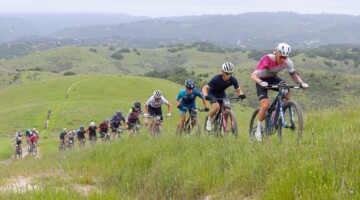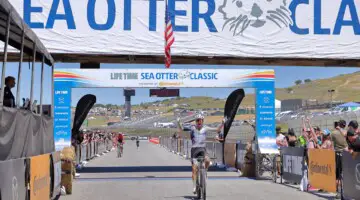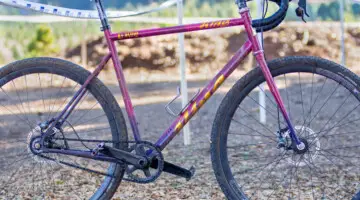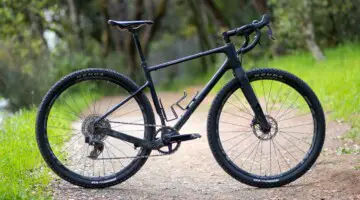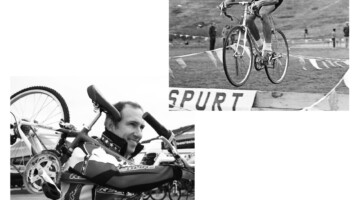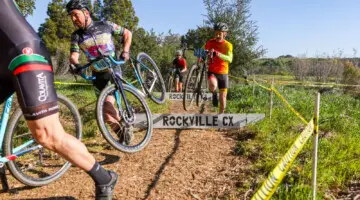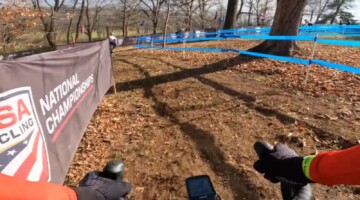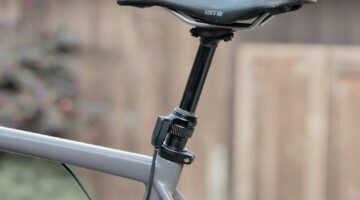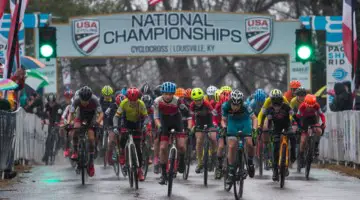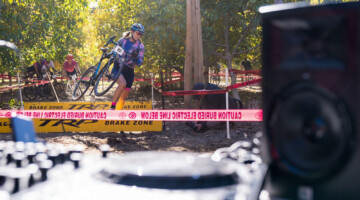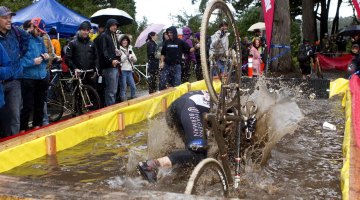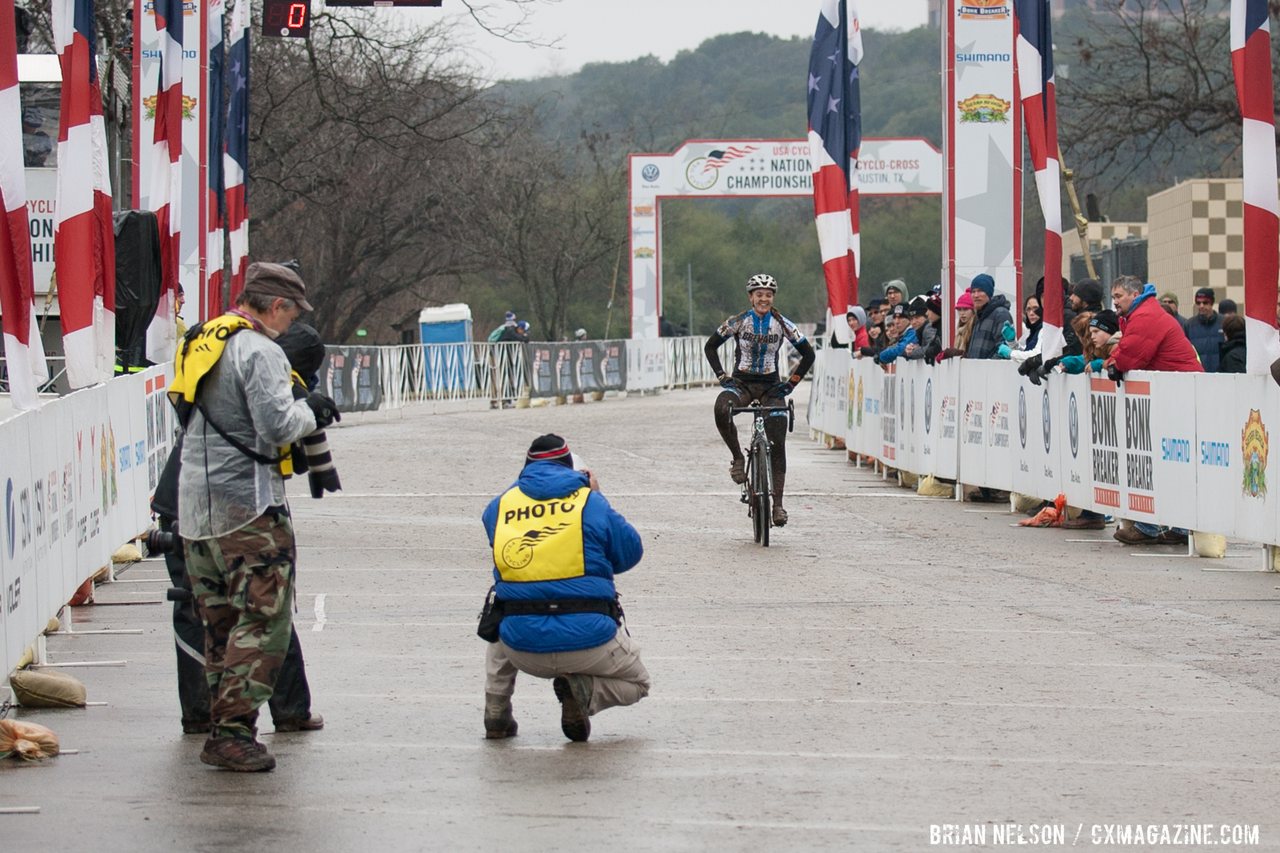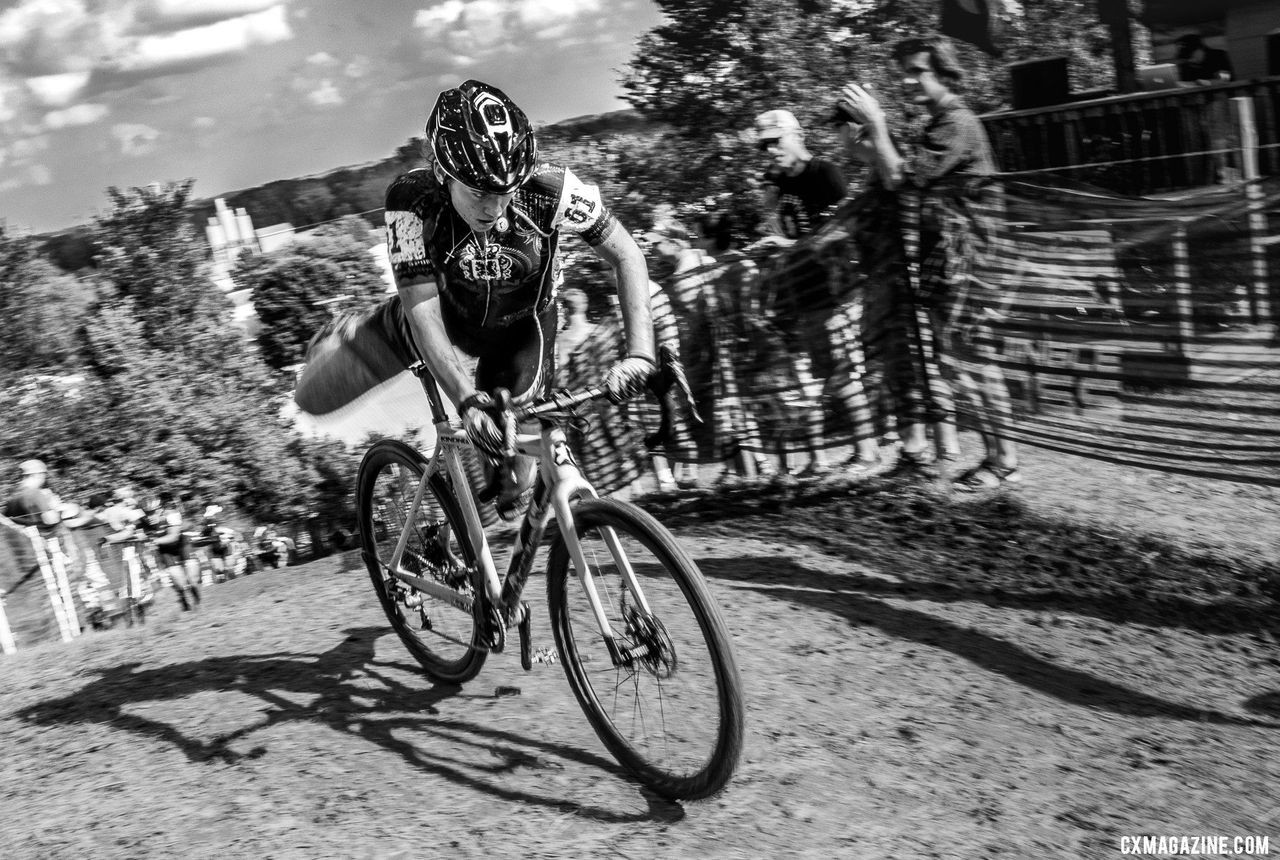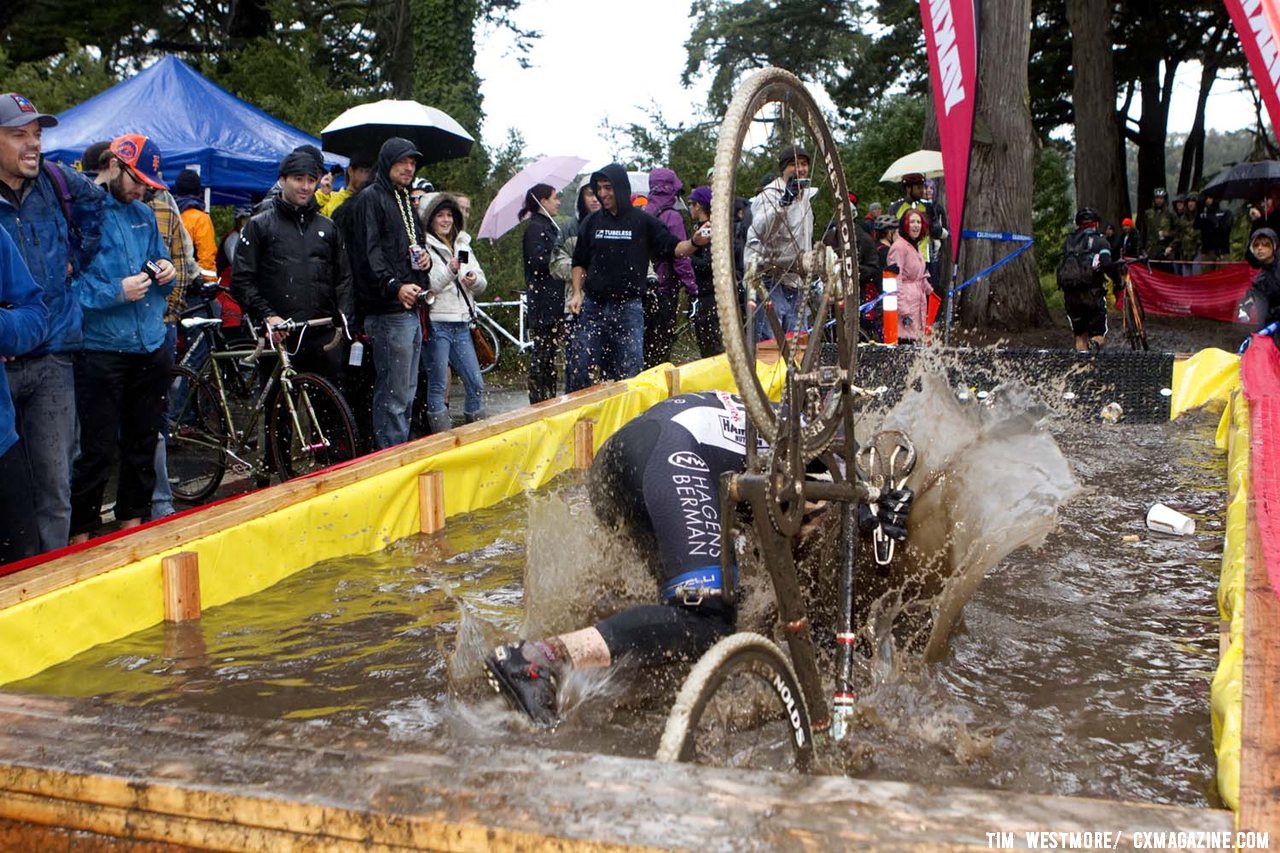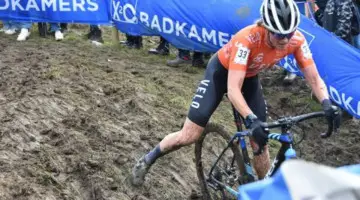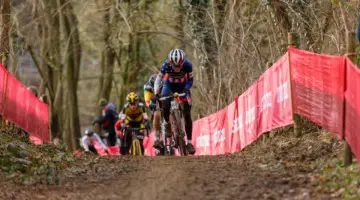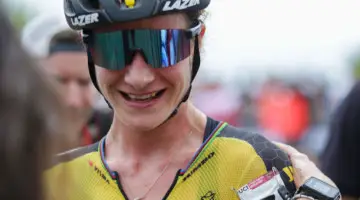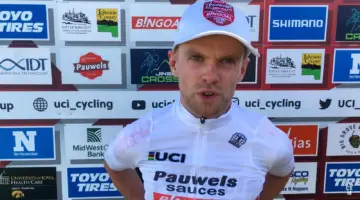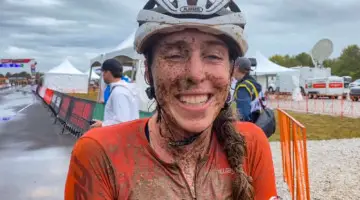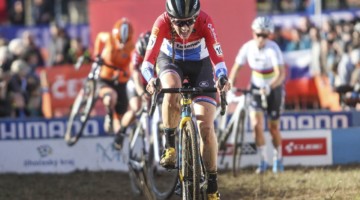Thus far in our series spotlighting the folks who make the cyclocross world go behind the scenes, we have met people who rarely venture out into the spotlight at the sport’s highest level. That definitely changes with this profile.
North Carolina’s Allison Arensman (JA King Cyclocross) has been very busy off the course helping develop and run the JA King Cyclocross women’s cyclocross Development program. With running the Devo team a full-time endeavor on its own, Arensman has also raced for the JA King Elite program alongside her sister Hannah.
As one can imagine, balancing running a devo program, racing UCI cyclocross and working as a coach to help pay the bills was a lot to handle for the young woman from western North Carolina to handle. Stubborn and motivated, Arensman made it work for several years.
“I’m the type of person who if someone gives me a challenge and says it’s going to be really hard or ‘I don’t know if you can do this,’ I’m going to be like, ‘Yeah, watch this, I’ll prove you wrong,’” Arensman admitted.
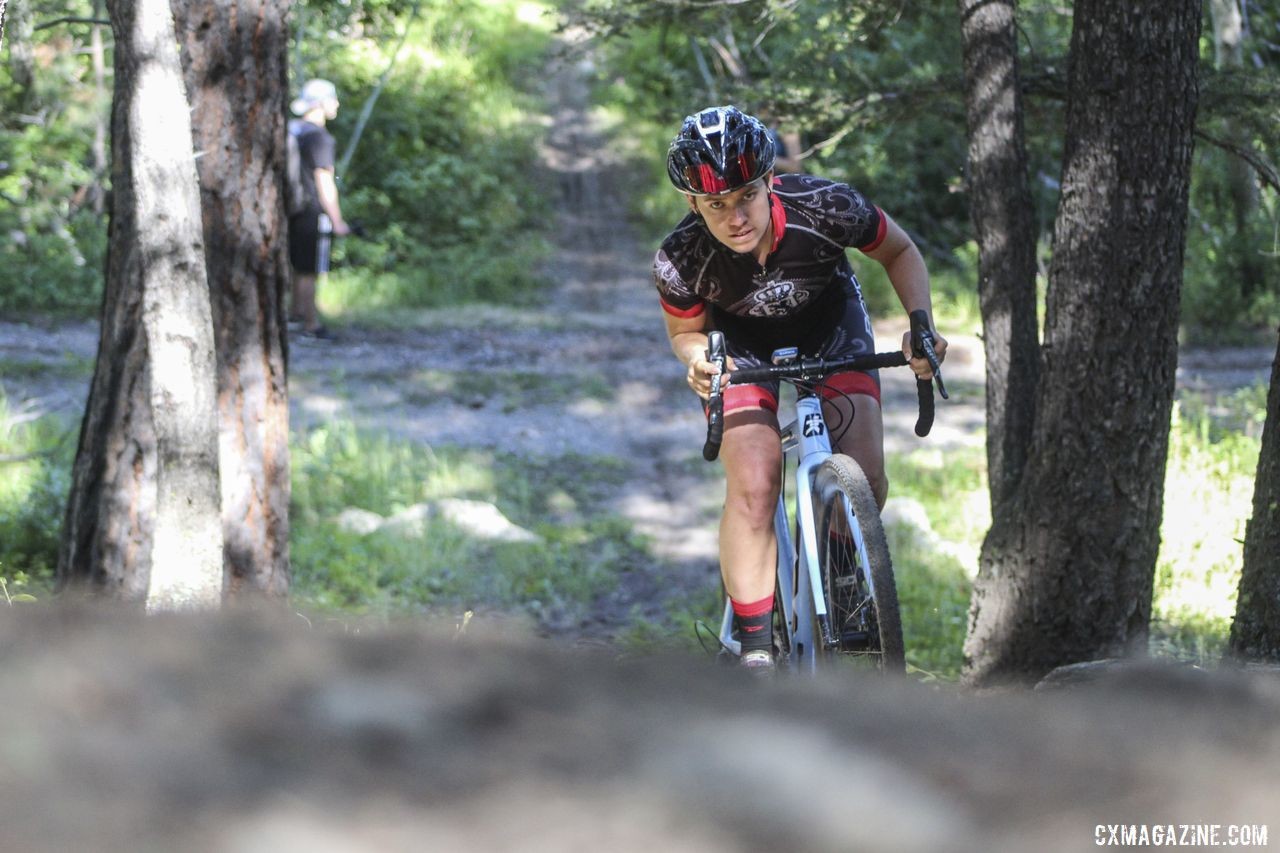
Arensman has never been one to back down from a challenge. 2019 Montanacrosscamp Women. © Z. Schuster / Cyclocross Magazine
The setup worked, until it did not.
Last year after the opening weekend of GO Cross, the years of stress and many responsibilities hit Arensman all at once. She decided to end her racing season and focus solely on running the JA King Devo program.
“Stuff hit the fan for me,” Arensman said about that situation.
As she recovered and spent excruciating months off her bike, Arensman realized that although she was mentally and physically exhausted, her passion for racing was still there.
With a comeback nearly a year in the making, Arensman has found a new balance with the JA King Devo program and her Elite racing goals. Arensman began a new phase in her athletic and professional career when she returned to the cyclocross course at GO Cross at the end of August.
Getting to that start line has been quite a journey, and if Arensman has anything to say about it, it will be far from her final destination in the sport.
Tar Heel Success
A quick look at Arensman’s Crossresults page shows she started racing cyclocross as a Cat 4 at racing age 17. Talk to enough professional athletes about how they got into cyclocross and you will find that many of them chose the sport because they were naturally good at it.
Arensman chose to try cyclocross but staying with it, well, perhaps the sport chose her.
“I progressed pretty quickly, my sister Hannah as well,” Arensman said. “It took me about a year to get from the 4s to racing with the 1/2s. When you do that, you’re able to get the attention of different cycling distributors in the area. They pay attention, and then you get grassroots sponsorship.”
Arensman grew up in Valdese, North Carolina, located east of Asheville. The region is known for its mountain biking, but when Arensman was growing up, the cyclocross scene, especially for young women, was relatively small. Being one of a few young riders in her local scene and having to chart her own path in the sport was an experience that was not lost on her, even at a young age.
When it came time for college, Arensman decided to stay close to home, attending Brevard College and racing for the Varsity cycling program there while studying exercise science and sports kinesiology.
Racing at Brevard proved a good choice for Arensman. She won the Division 2 Cyclocross National Championship in Austin in 2015, finished second behind Sofia Gomez Villafane at Collegiate Nats in Asheville and took third in Hartford in her last event as a Collegiate cyclist.
While experiencing that success in college, Arensman was already turning her eye toward putting together her own cyclocross program. “I think having my own cyclocross program is something my coach and I talked about for several years while I was a freshman and sophomore in college. I had gotten different opportunities with different teams and whatnot, but in 2016 is when I started it,” she said.
In a small community like the one cyclocross has, relationships are everything. Arensman’s cultivation of partnerships in the Brevard community and representing those who believed in her for years paid off when she decided to take the bold step of supporting her own racing.
In the fall of 2016, Arensman did a Super Senior semester of college at Brevard. She also started her cyclocross program that final semester. “I should have planned that better,” she admitted. “I should have made it some kind of internship project, but I didn’t. It was way too much.”
Fortunately, she did have good support from some folks who believed in what she was doing. Foremost among them was title sponsor JA King.
“They wanted to do something for the sport because they love cycling,” Arensman explained about the industrial services company. “The guy who owns it wanted to do something for women’s cycling. I met him and his family when I was racing a road race in Winston-Salem, and he was just a follower of me as a professional cyclist.”
“He was really blown away by the whole thing because we were so stoked to sleep on couches at supporter housing and eat burritos with eggs in them for breakfast. It’s not super glamorous, and everyone is really passionate about it. He decided he wanted to do something to support that side of the sport.”
She concluded, “It’s been really cool because every single one of the sponsors who I’ve been able to work with has that kind of heart. On that end of things, it’s been an awesome thing to be a part of.”
Giving Back
Growing up in Brevard, Arensman was acutely aware of the support the small community there provided her on her journey in cycling. Not surprisingly, a privateer program was not in the cards when she started JA King Cyclocross.
“You’ve probably heard this from other athletes, but you want to take care of yourself and be selfish in that way, but you also want to give back at some point,” she said.
Joining her in chasing Elite cyclocross dreams was her sister Hannah, then a freshman at Brevard. Just helping family was not enough, however. Arensman wanted to create a program to help other young women in the region chase their dreams.
By the mid-2010s, conditions in North Carolina were much more favorable to give other young women the opportunity to race elite-level cyclocross. “Coming through the Junior ranks, I was one of 3 Juniors and one of 10 women. It was tiny,” Arensman recalled. “It’s grown, and part of that is because we have a great series in North Carolina in NCCX. Now we have a NICA league in North Carolina too. Those things are growing the sport.”
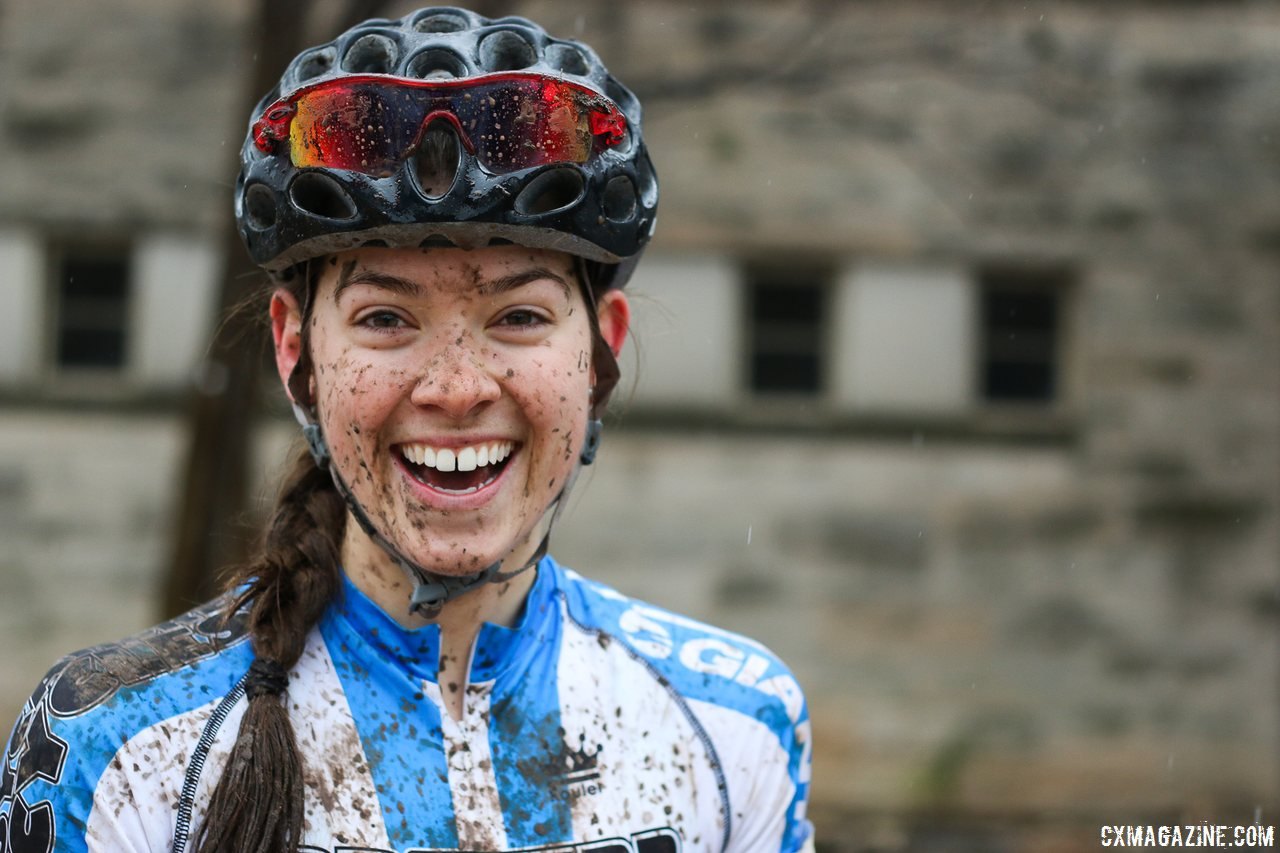
Allison Arensman was the beneficiary of a lot of support from her North Carolina Community. 2015 Collegiate Cyclocross Nationals.© Cyclocross Magazine
Arensman explained how her experiences helped shaped the philosophy behind the JA King Development program.
“There was enough opportunity there to start a development team aspect for cyclocross,” she said. “I came up kind of scrapping and flying by the seat of my pants figuring things out because there was no clear development pathway or no clear anything, really. I know where young women are, I know what it’s like where you’re on a Junior team but you want to up your game. Where do I go?”
The JA King program launched in 2016 with Allison and Hannah heading up the Elite team racing UCI races and World Cups and 6 young women racing in the Junior and amateur ranks. As Arensman mentioned, that first season was rewarding, if not really exhausting and challenging.
“I quickly found out that running a team, just running a team, is sooooo much work. Oh my gosh. I was like, ‘What have I done?!'”
Helping push her along was the knowledge JA King Cyclocross was unique on the cyclocross landscape. As an all-women’s Elite and Development program, it was the first of its kind in U.S. cyclocross.
That bit of history also helped Arensman connect with sponsors such as Nuun and DeFeet and ensure there would be support for what she was trying to build.
“When I went to the industry and got a couple of different sponsors, it was really cool for them too,” she said. “They could say, ‘We’re part of history. We’re not just helping pro riders, we’re also helping a development squad.’ Also, it was helping women’s equity in sport, and that’s really cool, so they got on board.”
Creating Opportunities, Teaching Ownership
The word “development” can mean a lot of different things in cycling. Young Juniors, older Juniors, U23, even U25. Since Arensman started in the sport a little later than some of her peers, she takes a holistic approach to cyclocross “development.”
“What this team has become is an all-women’s elite development team, but we’re giving it a full development scope where Juniors, U23. Collegiate and even some post-Collegiate riders can apply to the team,” she explained. “So many girls find cycling in college, but we never give them a shot because they ‘started too late,’ and they’re not young and winning national titles. Georgia Gould, for instance, she found cycling through college. What if she hadn’t had the chance to develop? She won a medal at the London Olympics.”
This year’s program lives up that mission with a mix of riders from each of those categories. “We’ve got two riders who are Collegiate/post-Collegiate, we’ve got two riders who are U23 and two riders who are Juniors on that development team this year. You’ve got the older girls who are going to handle things more maturely in the same tent as the younger girls. It gives you a ladder of mentorship, but everyone is still learning together and working together.”
The opportunity to travel to UCI races across the country with support is one many developing riders would love to have, but to date, the JA King Cyclocross team has largely remained a Southeast-based program thanks to logistical reasons.
With the Arensman sisters racing at the Elite level, they have to coordinate travel and racing schedules to get both the Elite and Development riders in the same place. Logistics are stressful enough, but the two sisters also have to perform well on the course.
“Professional riders are the breadwinners for the team. If we don’t get results and get noticed, then sponsors aren’t really going to want to stick around because there’s no return on investment for them,” Arensman explained. “We had to design a schedule where the professional riders could succeed, and we could bring the development riders who were both Junior and U23 over the last 3 seasons and let them be a part of where we were.”
Although the professional riders help support the Devo riders by winning payouts, Arensman has been very careful about how much support she and the team provide to the young riders. It is an ethos dictated by how she came up in the sport.
“I think one thing I learned when I developed was I figured a lot of things out myself,” she said. “While you want to give these girls a place to hang their hat and a place to belong, there needs to be a level of ownership and figuring things out yourself.”
She continued, “It’s a very fine balance to find, just because you’re facing that question of how much opportunity is too much opportunity? We want people who are going to take what they’ve been given but then turn around and use it to full capacity and give back.”
Several years into the program, Arensman said she thinks they have found a good balance of mixing ownership with opportunity.
“The preface of the team is it’s rider-run,” she said. “They have the resources to get mechanics for bigger races and that kind of thing, but a lot of that is going to require the riders to work together to bring the tent. This is their team, this is their stuff. They’re going to take care of it and work together to make it what they want it to be.”
Throughout her time running the program, Arensman has helped evaluate the young women applying to be part of the team and decide who will be a good part of what the JA King Cyclocross team is trying to do. Every year when she sits down to read those applications, the value of what she has built is driven home for her.
“Every single application said something like, ‘I don’t get to train with girls,’ ‘I have never been on a team with girls,’ ‘I just want the opportunity because I feel like that’s going to push myself more.'”
“When you’re with guys, you do get pushed physically, but when you get to technical features, you can give yourself an out by saying, ‘Well they rode it, but they’re guys.’ But if you’ve got a team of girls and you have someone like Jolanda Neff and she just rides it, then you’re like, “Well I gotta ride it.’ It’s inspiring.”
What Have I Done?
In the last year, I have taken a look inside the work Stu Thorne and his team do to run the Cannondale p/b CyclocrossWorld team, the behind the scenes work Brenna Wrye-Simpson does to make Team S&M CX tick and talked to Jeremy Powers about the challenges of running Aspire Racing while racing himself.
The upshot of those stories is running a cyclocross team is, as Arensman put it, “soooooo much work.”
Signs that racing, running a team and working as a coach were too much for the young athlete started to pop up in the first season of the JA King program. At that time, they were largely performance-based.
“The first season I tried to race and run the team and do all the things. I spent every single race from early September to November crashing every single race. And I don’t crash,” Arensman said. “I maybe have 2 crashes a year, and in the span of 2 months, I crashed almost 10 times.”
There is one that sticks out in her mind.
“One of them I punctured my hand and had to get it glued shut. My dad was at that one. He was like, ‘What was that? That wasn’t even a technical section.’ It came down to me being so frazzled before the race trying to run around and herd cats, if you will, making sure everyone was taken care of and getting them to the start line with everything they need. I wasn’t taking care of myself.”
Despite the crashes, Arensman had some good results that season on the national stage and got that podium finish at Collegiate Nationals in Hartford. Still, she quickly realized she could not too all the things and still be successful as a professional athlete herself. “Obviously that didn’t work, and I decided I needed to put some parameters in place for myself. That’s what I did the next season in 2017,” she said.
That season, Arensman podiumed at DCCX and had several top 5 finishes at UCI races. Things were seemingly on track, running the team and focusing on her own racing.
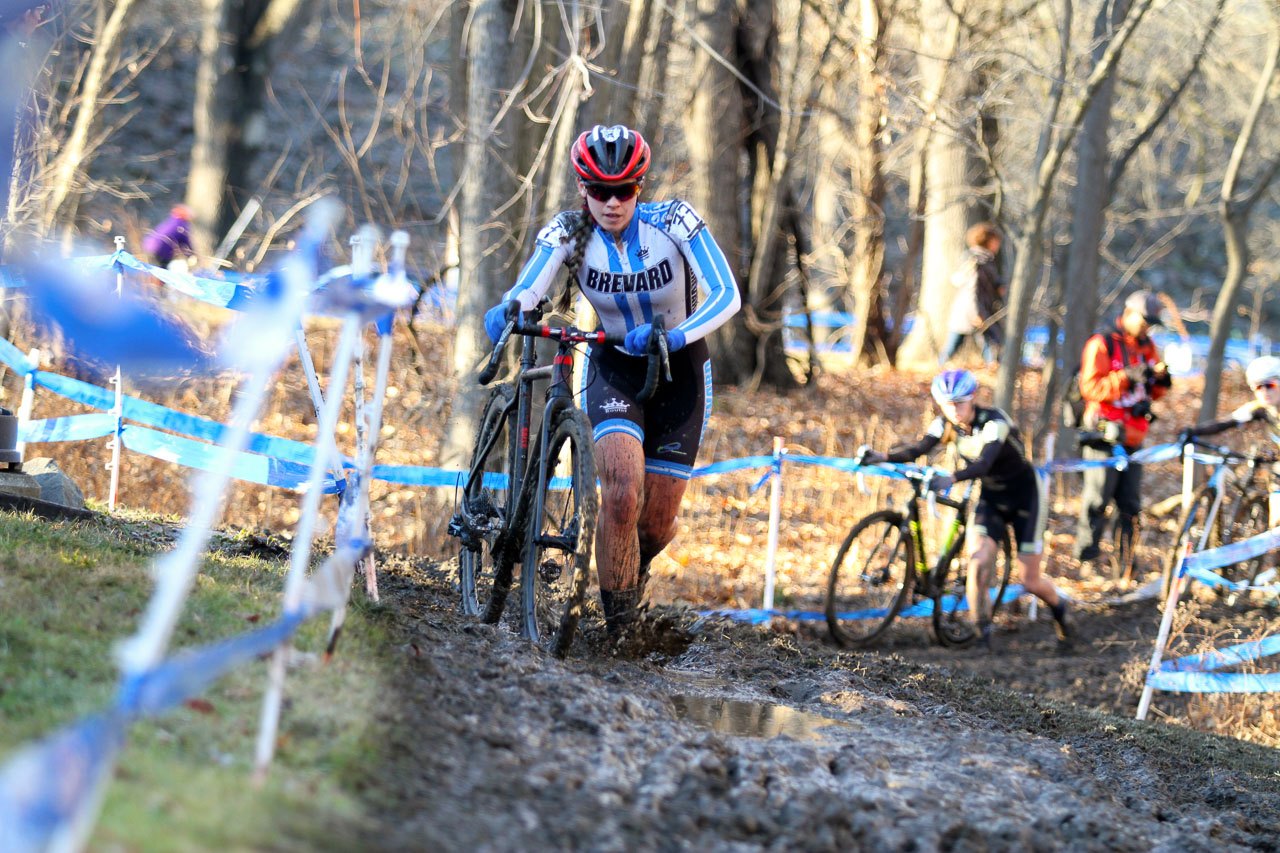
Allison Arensman started her 2017 on a positive note at Hartford Collegiate Nationals. 2017 Cyclocross National Championships, Women’s Collegiate Varsity Race. © D. Mable / Cyclocross Magazine
Until they were not. Arensman entered the 2018 domestic season expecting to give the UCI calendar a full go. She made the drive north to Roanoke for GO Cross and finished 16th and 12th. Not bad results, but there was something else going on.
All of the stress, all of the attention to detail, all of the responsibility hit her at once.
“I just did so much, so many times, to the point where my body couldn’t take it anymore,” Arensman said. “My body just shut down in 2018. I couldn’t train, I couldn’t race, I couldn’t do anything. I had to take the season off, and I just ran the team.”
“I still realized just how much work that was. I got done with every weekend, and I was completely exhausted. I was like, ‘How on earth have I toed the line and done this for so many years?’ I don’t know how I did it. It was just pure willpower where I was going to make it happen.”
Calling it quits was not easy for Arensman. She is the kind of person who is driven to succeed, especially when folks start to doubt she can get it done. As it has been said, it takes a village, and in the case of Arensman, she had some good people around her to help her gain perspective on her situation.
“Between my coach and my parents and a couple of other people who have been huge mentors in my life, I had a lot of wisdom being spoken into my ears. They were like, ‘You need to stop.’ That’s what I needed to hear because for me to stop is to admit I’m weak and I cannot get over that kind of thing. I needed that outside perspective.”
That did not mean that ending her 2018 season in September was easy. “Taking that time off about killed me, to be honest. I didn’t know what to do myself,” Arensman said.
Fortunately, her passion for the sport still burned, and come the end of the cyclocross season, she was making plans to continue her own cyclocross career this fall.
Sisters, Friends, Bike Racers
Allison Arensman grew up as one of eight children in her family. She is the second oldest and the oldest daughter, meaning some of her siblings looked up to her quite a bit.
One of those siblings was her sister Hannah. Four years younger, Hannah was a bit of a doting duckling, as younger siblings are often want to be. As a result, the cycling Arensmans were not necessarily super close growing up.
“It’s like, ‘You need to go and have your own life and have your own favorite color and your own favorite animal. Like, chill,’” Allison said. “That was pretty immature on my part, but that’s how I was all the way through high school, trying to be my own person and a special snowflake.”
The Arensman sisters got to share an incredible experience in 2016 when they were both named to the Team USA U23 Women’s team. The two traveled to Heusden-Zolder and raced to within two spots of one another. At least was is an incredible experience looking back.
“That was our first time being on the same team and racing at that level,” Arensman recalled. “It was hard, again, because she was just my shadow and I couldn’t get rid of her. I was like, ‘Can you please be your own person?'”
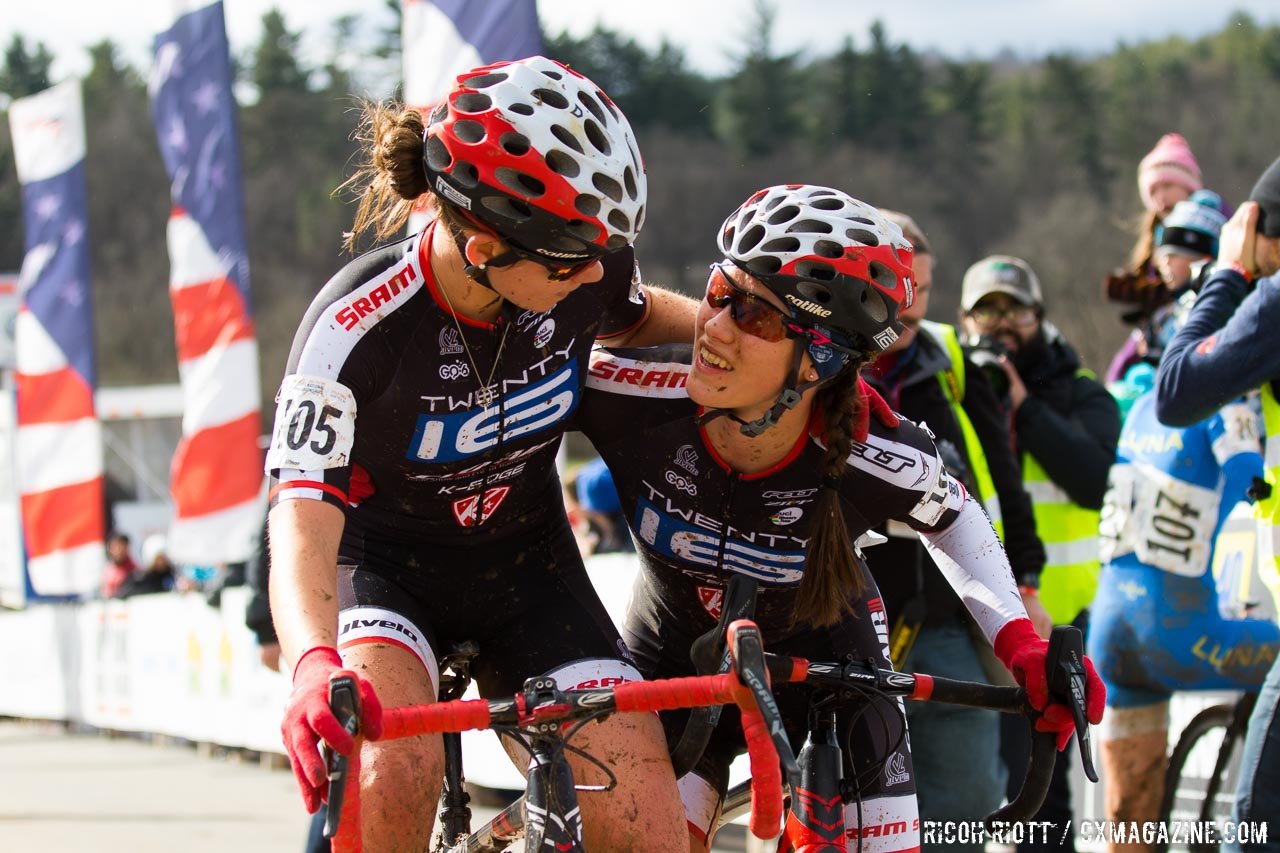
Hannan Arensman (right) celebrates her 17-18 Women’s title with sister Allison (left). Women Youth, 2016 Cyclocross National Championships. © R. Riott/Cyclocross Magazine
Things started to change for the two Arensmans that following fall when Hannah also enrolled at Brevard and joined the Varsity cycling program. Allison was in her final semester, and Hannah opted to move into her apartment.
“She’s 4 years younger than me, so there’s obviously a difference in maturity and development in our brains,” Allison said. “There were a lot of childish things I was frustrated with. All she wanted to do was race bikes with me and ride, and all I could think about was the fact she didn’t do her dishes again.”
Issues with dishes and chores aside, that semester living together was a key time in bringing the two sisters closer together. Living together and getting the opportunity to train and race together set them on a path of growing into the team they are today.
“That’s been a really cool journey because we’ve gotten over ourselves and differences and really become close, especially over the past year,” Arensman said. “This year we’re both on the JA King, and she’s going to be co-running it with me. She’s going to be carrying that weight, and she wants to.”
Allison continued, “It’s been bumpy, and I’m thankful that if you can get through the hard times, it makes you stronger on the other side, and you can really build some strong relationships. I’m really excited to be able to race with her this year, and she’s so pumped. We’ve been texting all summer long because she’s been gone and I’ve been gone, like ‘Dude, I miss you.'”
“In everything I’ve done, she is my biggest cheerleader, and it’s been phenomenal to grow closer. She’s a great person.”
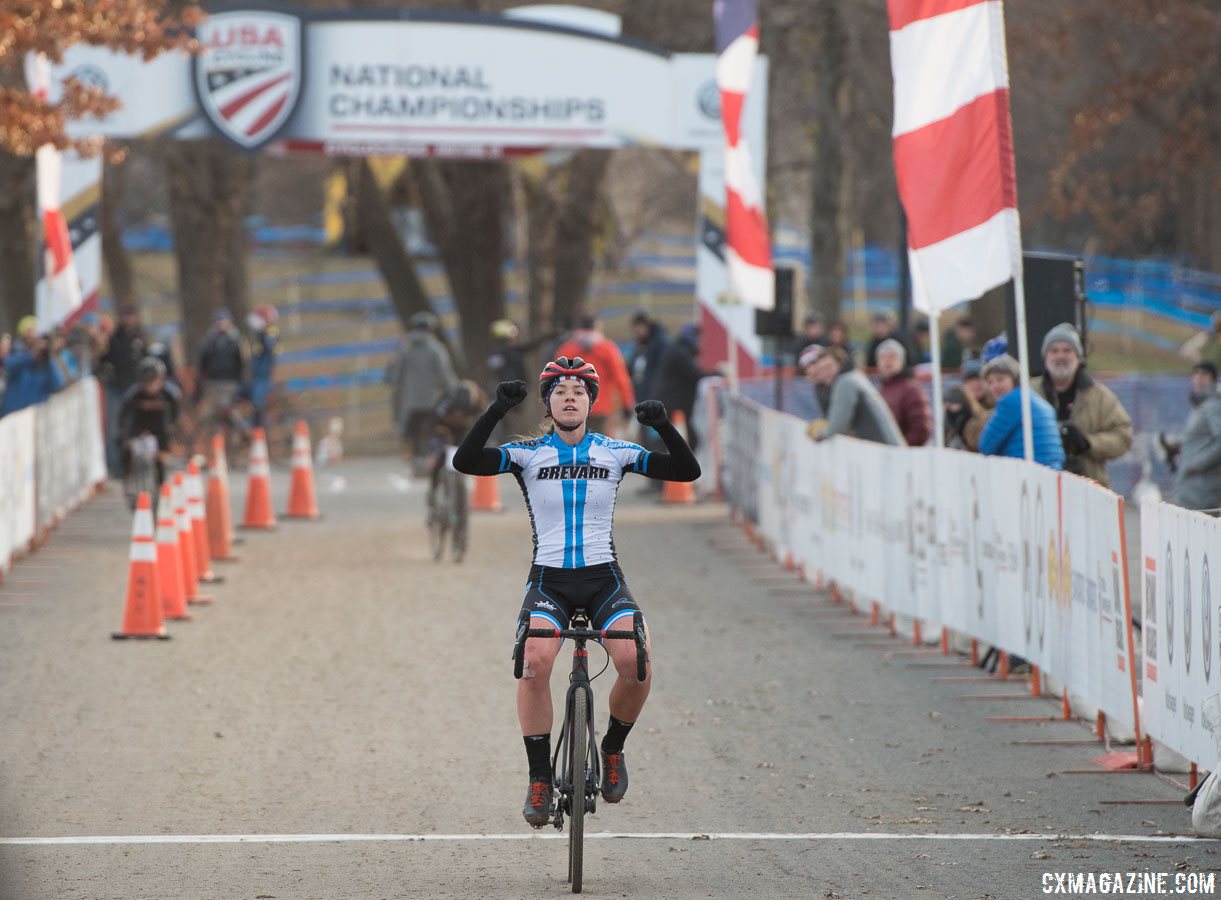
Allison Arensman raced with sister Hannah at Hartford Collegiate Nationals. 2017 Cyclocross National Championships, Collegiate Relays. © A. Yee / Cyclocross Magazine
The relationship between the two goes both ways. When we spoke, Allison recalled her sister “sending it” en route to a Collegiate Varsity National Championship at Reno Nationals. Her younger sister’s care-to-the-wind riding style has worn off on the more cerebral older sister.
“I can’t even tell you, but having my sister to be able to train with is one of the biggest blessings in my life,” Arensman said. “She just sends stuff. She’s so pumped to go for it and does not think about it. That’s really good for me because I’m really good at analyzing risk. I’ll send it, but not to the level that Hannah does.”
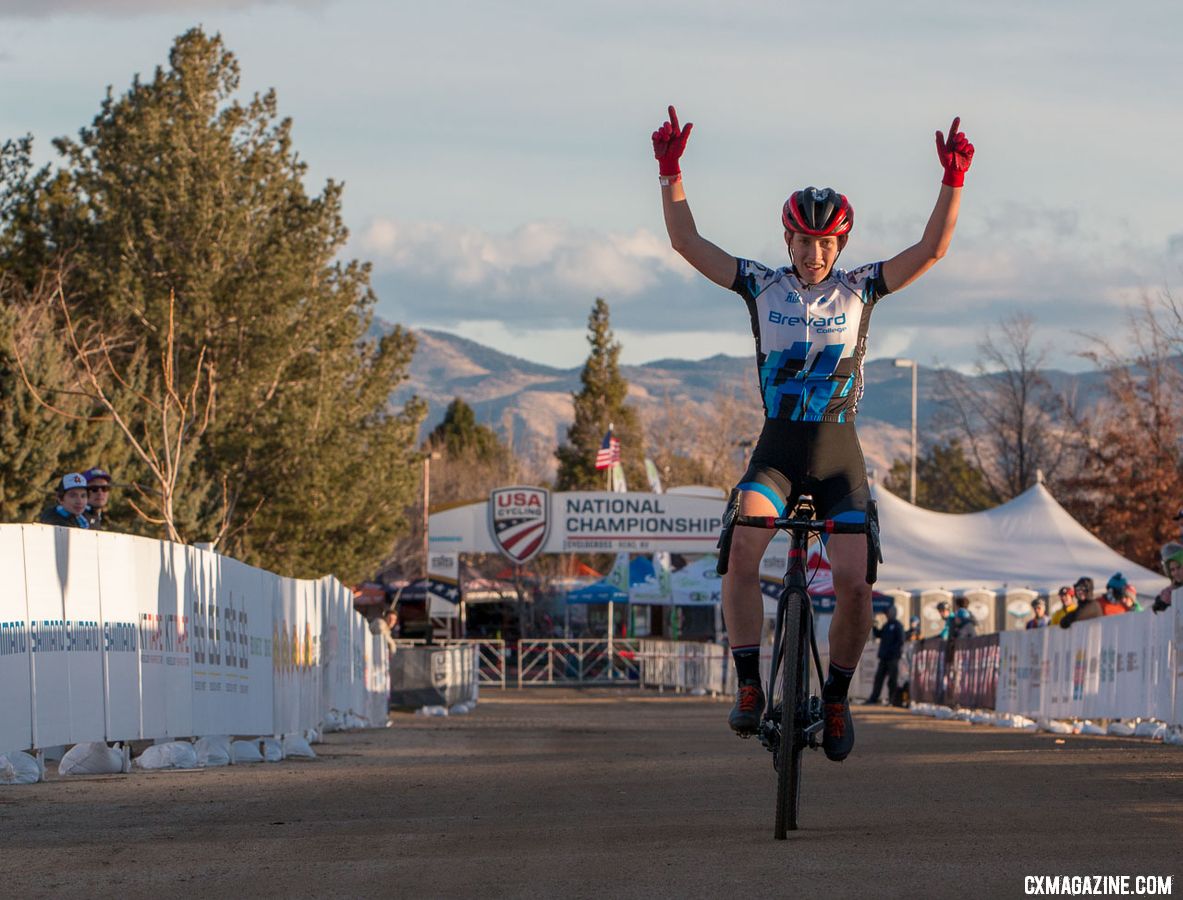
Hannah Arensman went full send to win Reno Collegiate Varsity Nationals. 2018 Cyclocross National Championships. © A. Yee / Cyclocross Magazine
How close are the two sisters now? This season, they launched a YouTube channel called the “Arensman Sisters” to document their season racing together and helping provide guidance to the JA King Development program. They released their first episode a few weeks ago, if you would like to check it out.
“It’s cool to give people more of a perspective than just your name on a piece of paper next to a number. Give them a perspective behind the scenes of what actually happens,” Arensman said. “Like, ‘Hey, we’re driving the tractor trailer through snow for four hours to get here.’ I think it will be funny. Ideally, it will be entertaining.”
The Long Road Back
After hitting a wall and completely shutting down in 2018, returning to the same level of involvement with the JA King Cyclocross Development team while trying to race as an Elite would have been a recipe for repeated disaster for Arensman.
Following her years of experience being stressed to the limit, she knew she had to step back and cede most of the control of the Devo program. To do so, she again called on the relationships she has built in the Brevard and North Carolina communities.
“After last season, I was like, ‘This is it. I’m not going to run the development team anymore. I’m going to go after cycling and try to be a professional athlete,'” she said. “The Development team is such a massive thing. I went to several people in the community who have always been supportive of the team and said, ‘Hey, I can’t run this.’ They got on board, and we’ve got six people who help make this thing a reality.”
Arensman still stays involved as an advisor and coach to many of the women on the team, but she now has a lot more freedom to focus on herself and what she needs to do to reach the sport’s highest level.
The road back, however, has not been an easy one.
“After last season, I was kind of starting from square one. There were literally two and a half months where I wasn’t doing anything. No fitness, no strength,” she recalled.
Working with coach Sonny Dyer, Arensman decided to take the approach every cyclist dreads—focusing on her limiters.
“I took a look at the last several years and said, ‘Where are my weaknesses?’ and ‘What exercises do I really dislike?’ And a lot of them revolved around running. It is something I am not good at.”
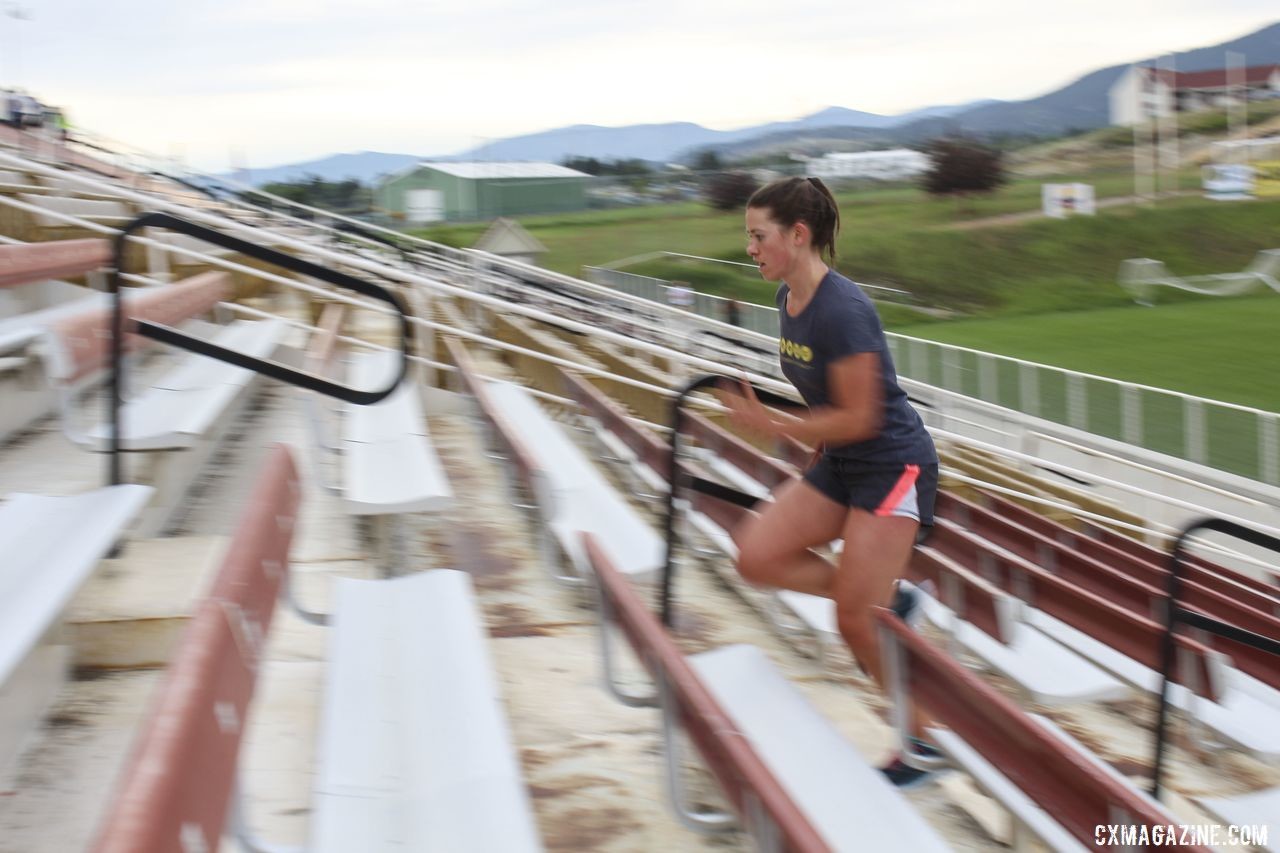
Arensman, here at Montana Cross Camp, put in her time running this offseason. 2019 Women’s MontanaCrossCamp, Wednesday AM. © Z. Schuster / Cyclocross Magazine
Since running by itself is kind of terrible for a lot of cyclists, Arensman came up with the idea of doing XTERRA triathlons. The swimming would help with her cardiovascular development, the biking would keep things interesting and the running would let her focus on the skill she really wanted to develop.
The first XTERRA? It did not go so great.
Arensman entered a race in Myrtle Beach on a day when temperatures soared into the 90s. Dealing with heat has always been an issue for her, and on that sweltering South Carolina summer day, she had to fight her heat nemesis once again.
Arensman was crushing it after the swim and bike, but a few miles into the run, she completely collapsed and blacked out. “Second place was about to catch me because I was just shuffling at this point. She was really cool and stopped, and I was like ‘It’s okay, just leave me here to die. It’s fine.’”
Showing some of her trademark stubbornness, Arensman still finished the race, no matter what it took.
“I looked down, and I saw fire ants biting my hand. I had collapsed right next to a huge fire ant mound. I was crying, I couldn’t breathe. I was determined to finish that race. I basically walked in. I was like, ‘Even if I have to crawl in, I am finishing this race.’ That was my first XTERRA. It was great, awesome. Not really.”
Arensman is able to have some humor about that first Xterra now, in part because the next three went much better. It does, however, seem like a representative case of the stubbornness and willingness to finish what she has started that has led Arensman to athletic, academic and professional success over the years.
After working as a guest coach at Montana Cross Camp, Arensman was able to take a training vacation out West where she did some mountain biking and then get smashed on the famed Colorado group rides. After heading back home, Arensman did not have much time to regroup with GO Cross in Roanoke awaiting as the location for her return to cyclocross at the end of August.
The Return
There is really no guidebook for returning to an endurance sport like cyclocross after taking time off. It is natural to expect the same results, the same performance as when you left the sport, but over time, things have changed. You as an athlete have changed.
Then there is dealing with whatever it was that forced you to take time off.
Managing expectations and being content with 10th instead of a podium or top 20 instead of top 5 can be challenging for athletes used to success. A growth mentality is a must to handle the inevitable setbacks and challenges.
When the season started, Arensman sought to manage her expectations by taking a rather long view of where she wants to end up. After all, with no UCI points to her name, she would be starting on the back row of some quite large Women’s fields.
“Ultimately, what I’m building toward, big picture, is the 2022 Worlds in Arkansas. That’s my overarching goal,” she explained. “I’m planning a European block for this season because that’s where you need to get a lot of your development because it’s so much harder there. I’m just putting in the steps to maintain a big-picture focus and do the best I can in the moment.”
When Arensman abruptly left the sport last fall, she was in a deep hole on many levels. Keeping an eye toward where she was and where she is now has also helped her keep a level head about what to expect.
“I just have to keep perspective. Personally, physically, mentally, I have come so far since December,” she said. “I need to not get ahead of myself knowing if I stick to the process, stuff is going to happen. It’s already come back very quickly.”
“I don’t expect to be my absolute best athlete I’ve ever been this season, but I expect myself to do well. You can’t control results, but what you can control is your attitude and how you react to things.”
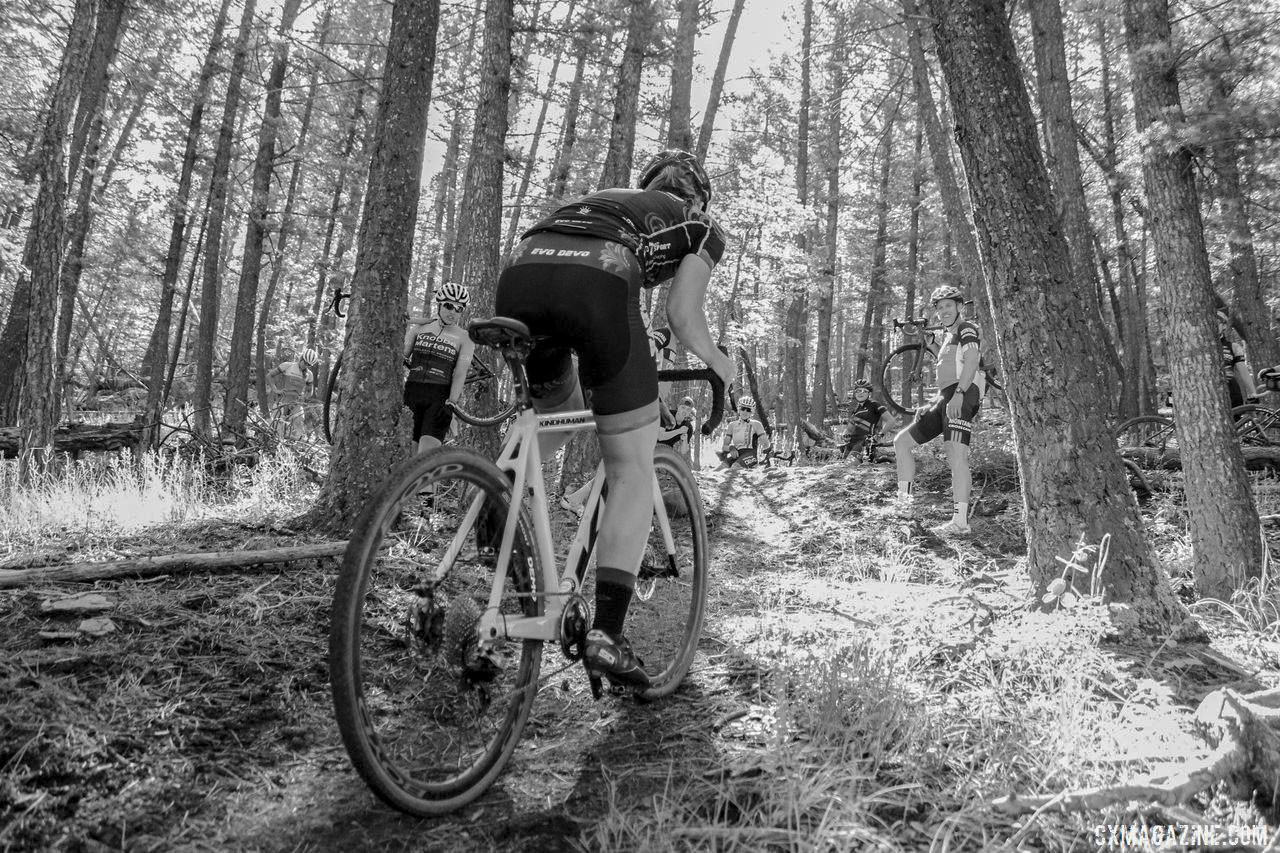
Arensman has literal and figurative hills to climb this year. 2019 Montanacrosscamp Women. © Z. Schuster / Cyclocross Magazine
Fortunately for Arensman, the opening weekend of the season was in Roanoke, only a 4-ish hour drive from Brevard. Darn near local by U.S. cyclocross standards.
Racing from the random draw section of the start grid, Arensman finished 15th on Day 1 and followed it up with an 11th on Sunday.
Despite the heat—that life-long nemesis—Arensman said she had some good feelings during the weekend. “You know, I actually felt better than I anticipated. I hadn’t done really any super high-end work because of the fitness re-build process. So I surprised myself with the level of pace I was able to cope at.”
After GO Cross, Allison and Hannah headed north to Iowa City for the Jingle Cross weekend. Hannah was selected to represent the U.S. in the World Cup as a U23 rider, and Allison jumped in the C2 on Friday night and C1 on Sunday.
With bigger fields at those races, she again faced what described as the toughest part of the whole racing experience thus far.
“I know how to race with a 1st, 2nd or 3rd-row start, but with so many of my starts being from the dead back, it is actually a very different approach. Especially on the super-fast ‘crit on twisty grass’ courses that pepper the start of the U.S. calendar,” she explained.
“If it’d get muddy and cold, I’d be such a happy girl. But until then I’m slowly but surely figuring out the nuances of the back grid launch.”
Arensman admitted that even though the season is a process for her, she still had pretty high expectations for those first race weekends that were not necessarily met. “It’s been a slow process,” she said of getting results. “I’d be lying if I didn’t say that when I got to GoCross I expected to come in and immediately net top 10s.”
“At both GO Cross and Jingle Cross there have been factors—weather and life—in place that were out of my control. Call it a bunch of bad luck, but really it’s an opportunity to learn to overcome, control what you can control and leave the rest to God.”
That said, it is still good to be back. Back racing. Back pushing herself. Back having her body respond when pushed.
Being back fully immersed in the cyclocross community has certainly helped as well.
“It’s easy to lose sight of how far I’ve been able to come in less than a year, to forget to be grateful to toe the line and go full-send again,” Arensman said. “I tell you though, the awesome cyclocross community definitely helps my gratitude practice—it’s so rad to be around these racers, families and fans again. Such good people.”
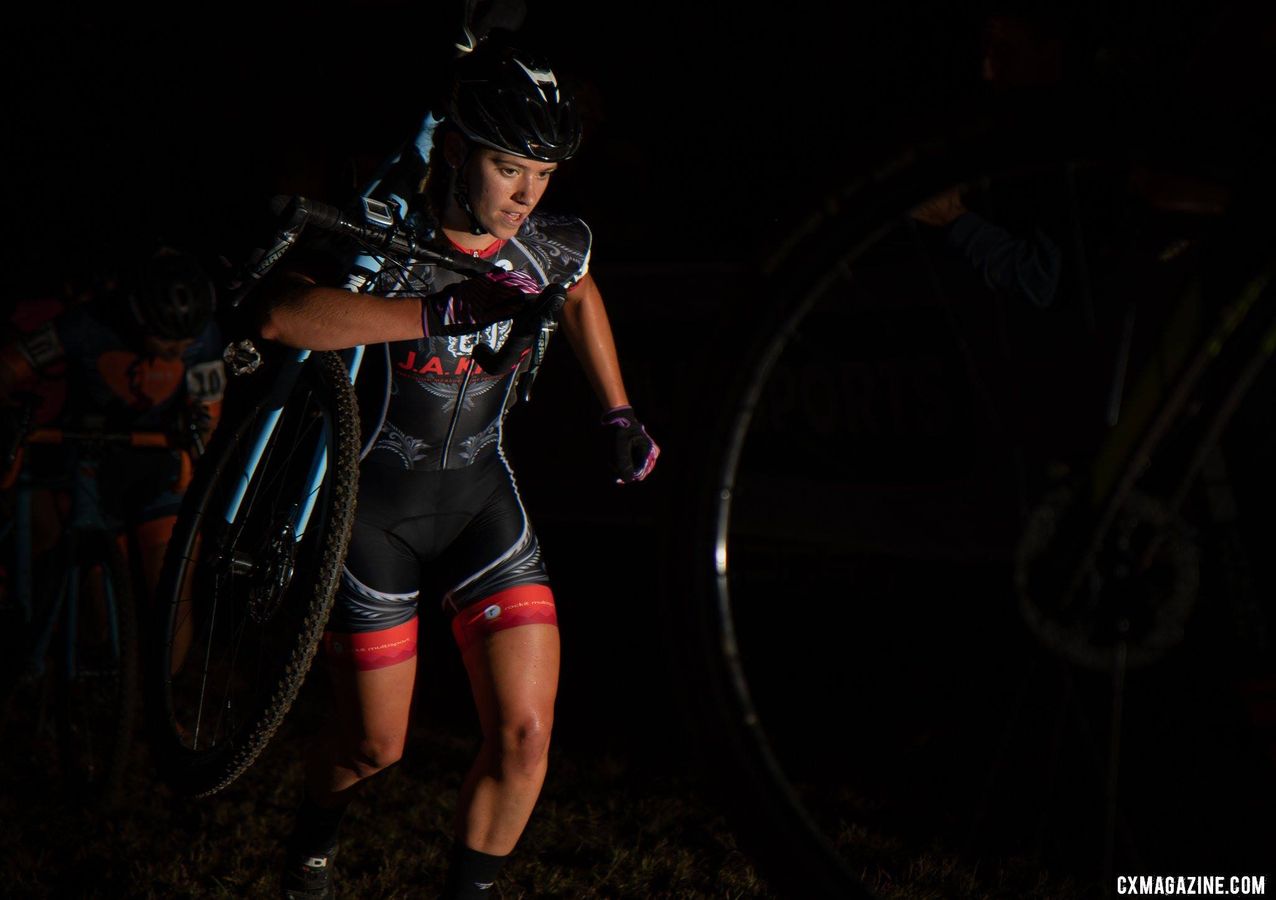
Allison Arensman returned to racing at Jingle Cross this year. © A. Yee / Cyclocross Magazine
After cleaning the mud from FayetteCross off, Arensman now heads into the meat of her 2019 domestic schedule with personal favorite DCCX up this weekend followed by Kings CX in Cincinnati and then Pan-Ams in Ontario.
If she is being honest with you, Arensman will tell you that she does have results goals for those races—aspirational ones at that—but a comeback is a process, not a destination, so when Arensman hits those start lines, she will take with her a rather simple mindset.
“Full send, regardless of results.”

